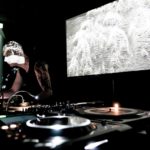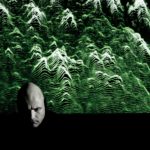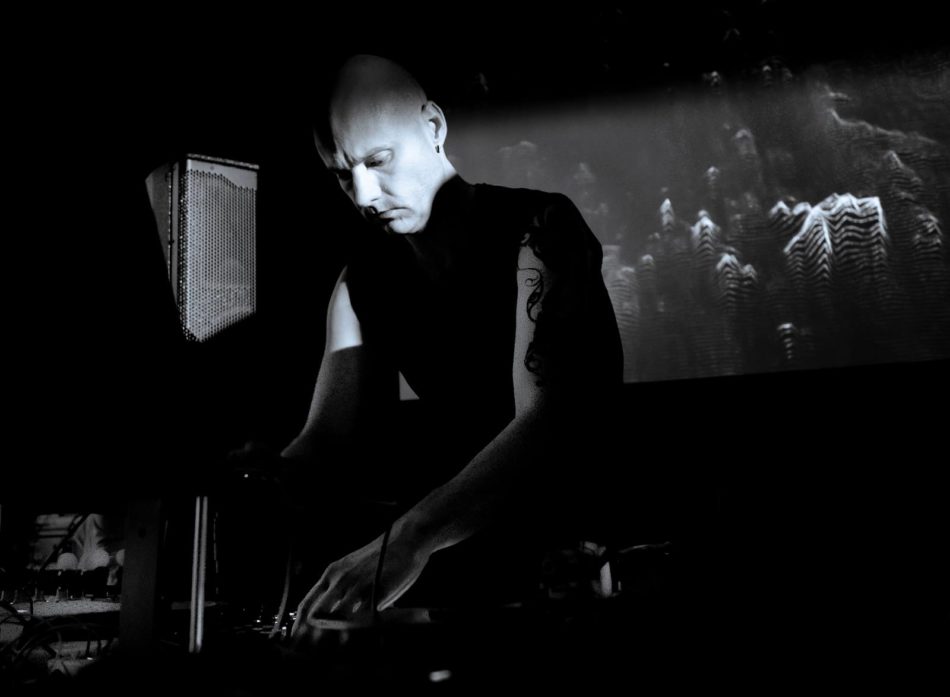KAFKA is one of the bold artistic faces making Vancouver his home and pushing the boundaries of what it means to be a techno musician on the West Coast. In this interview, we focus on what essentially makes KAFKA, and the sound that project represents, a reality.
1. How did the KAFKA project take shape in 2013? Can you explain what was going on just before the project began, and what motivated you to start this new project that’s still going strong years later?
That’s actually a much more loaded first question than you know. Haha. To be truthful, I was going through a marriage separation at the time. Was traumatically not fun. I decided to put another long-term musical project on hold in order to focus what little creative energy I had on something new that would give me the freedom to navigate the complexities of all the things I was feeling without the need for a lyrical story – there were vocals in this other project. It alleviated a tremendous amount of pressure and allowed me to express all the sadness and anger and confusion, and eventually empowerment and love and happiness, without leaving myself feeling so vulnerable. So that is what KAFKA was ultimately born out of. Pretty heavy. Haha!
Â
2. Does the KAFKA name have something to do with metamorphosis, or maybe a rebellion against rigidness of the structures in our society, as in “Kafka-esqueâ€?
I had actually been experimenting with the musical direction of the project for about a year or so before I even started thinking of a name. It took me a while to settle on a style that I felt was an accurate expression of where I was at that time, as well as one that I could continue to grow and evolve with over time and not get bored of. I stumbled upon one of Kafka’s stories one day (coincidentally, I believe it was Metamorphosis) initially just thinking it would be a cool sounding name for a techno project. But as I investigated more about his personal life – which is quite tragic – and read deeper into his stories, I found that I identified with so many aspects of his protagonist’s predicaments – the bizarre surrealism, the feelings of alienation, anxiety, persecution and guilt, and especially confusion – it just seemed like the right fit. I was in such a state of ungroundedness and imbalance, and simply connected with his stories in a very deep, visceral way. Kind of felt like the kid in The Never Ending Story. Haha.
Â
I like to sit in those elements longer, become hypnotized by them. I think that is where the journey and the elation of dancing to music really comes from, at least for me personally – getting lost in it.
3. How do you feel your live PA has evolved over this time? Do you feel like you’ve zeroed in on a certain atmosphere, a way of producing, or of performing?Â
 It hasn’t evolved a lot through this project specifically. I’m doing things pretty much the same way as when I started performing as KAFKA in 2014. Though my writing and production workflow has certainly changed. With previous projects I had a ton of outboard gear. Well, in the 90’s, before the dawn of affordable laptops and DAW’s and software instruments, one didn’t really have a choice. I used to perform and tour with a massive amount of gear. It would take a crew of people hours to setup – it looked impressive, but was a lot of work. So as computers became more affordable and software started becoming available, I slowly migrated all the hardware over to software, piece by piece. I started using Emagic’s Logic Platinum back in 2007 – version 3. It made everything so much more efficient and manageable, I could work faster, save every aspect of my production, easily convert studio projects into live performances, and take my entire studio with me everywhere – no more frustration when I’m trying to work away from the studio and didn’t have that synth or drum machine with me. I still work that way today. Have been very tempted over the years to get back into hardware, there is certainly a lot of reasons to these days. But there is still much more value for me in having my entire studio with me everywhere I go.
It hasn’t evolved a lot through this project specifically. I’m doing things pretty much the same way as when I started performing as KAFKA in 2014. Though my writing and production workflow has certainly changed. With previous projects I had a ton of outboard gear. Well, in the 90’s, before the dawn of affordable laptops and DAW’s and software instruments, one didn’t really have a choice. I used to perform and tour with a massive amount of gear. It would take a crew of people hours to setup – it looked impressive, but was a lot of work. So as computers became more affordable and software started becoming available, I slowly migrated all the hardware over to software, piece by piece. I started using Emagic’s Logic Platinum back in 2007 – version 3. It made everything so much more efficient and manageable, I could work faster, save every aspect of my production, easily convert studio projects into live performances, and take my entire studio with me everywhere – no more frustration when I’m trying to work away from the studio and didn’t have that synth or drum machine with me. I still work that way today. Have been very tempted over the years to get back into hardware, there is certainly a lot of reasons to these days. But there is still much more value for me in having my entire studio with me everywhere I go.As for the evolution of my productions, up until a couple years ago I always wrote with the intention and perspective of it going on a release. It was later that I would figure out how to perform it live. But a couple years ago I decided to shift that intention to writing specifically for the dance floor. People have a very different perspective in a club, dancing, feeling the music and not just listening to it. Our relationship with the music is very different in that environment. We have a different attention span and like to immerse ourselves in the soundscape, the energy, in a very different way. I always find it frustrating when I’m on the dance floor – and I am a lot – and a really amazing element of a track comes in, and then it’s just gone just as I was started to settle into it. I like to sit in those elements longer, become hypnotized by them. I think that is where the journey and the elation of dancing to music really comes from, at least for me personally – getting lost in it. So with that intention my productions began to take a very different form. I started to make projects in Logic for an entire set, or large portion of it, rather than simply an individual track. I wanted to hear what that journey would sound like without having to jump from project to project. So they were paced differently, had more unconventional structures like chapters rather than an intro, climax, breakdown, outro, etc. I allowed parts of songs to go on much longer than I necessarily would on a track for a recorded release because the listener connects differently with the music on the dance floor and has a longer attention span. This is actually the reason I haven’t released any material – other than a few remixes – in the past couple years. Because I’ve been focusing specifically on live productions. Now I’m in the process of taking those live projects and changing them to make more sense for a release. And in that process they are taking a very different form. I’m super excited about what’s coming out of all that. But I’m also impatient – I have more creative energy these days than I have time.
Regarding my actual performing process, I export stems and loops out of Logic into Ableton Live. I always have a fairly rigid structure to my sets. I have a little flexibility and control over effects and filters and such. But having performed in many different ways over the years, I still find that I can tell a better story and take people on a more engaging journey if I script the set to a large degree – though I do have different sets depending on the gig, in fact I’ll often program a different set for each gig so they are not all the same. Changing my performance style to allow for more flexibility is definitely something I am working towards. But the tracks are very complex. For example there is always a shit ton of dynamic automation on the instruments and effects. Elements are constantly changing, morphing, evolving throughout the course of the track. So it’s impossible to reduce things to simple loops. I would really like to open things up a bit more for improvisation, but not at the expense of the music and my ability to take people on the best journey possible. Finding the right balance of the two takes time.
Â
For me, inspiration and influence are not necessarily coming from the same places. Styles or genres don’t inspire or influence me so much as individual artists who have the ability to tell a story with their music and pull me into that story.
4. The feeling your music takes on is this otherworldly hypnosis. Is there any basis for this kind of pursuit to your particular sound? Do you have any particularly strong influences or inspirations that affect your productions? You must take in a lot of fresh releases with the frequent DJ performances we see you doing.
Oh, there is definitely a basis for the otherworldly hypnosis. Haha. It’s true, I’m hearing a lot of  new music on a regular basis. I honestly can’t absorb it fast enough. Mind you I’ve been DJ’ing much less over the past year so I can work on new music, so I haven’t been taking in as much as usual. But coming back to spinning a few gigs over the past few months, and searching through new releases again, it’s overwhelming how much I’ve got to catch up on. I often hear people complaining about how there is no good new music out there anymore, but I personally feel the opposite. It’s out there, you just won’t find it on the iTunes or Beatport charts. You need to spend a bit more time and effort digging for it.
new music on a regular basis. I honestly can’t absorb it fast enough. Mind you I’ve been DJ’ing much less over the past year so I can work on new music, so I haven’t been taking in as much as usual. But coming back to spinning a few gigs over the past few months, and searching through new releases again, it’s overwhelming how much I’ve got to catch up on. I often hear people complaining about how there is no good new music out there anymore, but I personally feel the opposite. It’s out there, you just won’t find it on the iTunes or Beatport charts. You need to spend a bit more time and effort digging for it.
 new music on a regular basis. I honestly can’t absorb it fast enough. Mind you I’ve been DJ’ing much less over the past year so I can work on new music, so I haven’t been taking in as much as usual. But coming back to spinning a few gigs over the past few months, and searching through new releases again, it’s overwhelming how much I’ve got to catch up on. I often hear people complaining about how there is no good new music out there anymore, but I personally feel the opposite. It’s out there, you just won’t find it on the iTunes or Beatport charts. You need to spend a bit more time and effort digging for it.
new music on a regular basis. I honestly can’t absorb it fast enough. Mind you I’ve been DJ’ing much less over the past year so I can work on new music, so I haven’t been taking in as much as usual. But coming back to spinning a few gigs over the past few months, and searching through new releases again, it’s overwhelming how much I’ve got to catch up on. I often hear people complaining about how there is no good new music out there anymore, but I personally feel the opposite. It’s out there, you just won’t find it on the iTunes or Beatport charts. You need to spend a bit more time and effort digging for it.For me, inspiration and influence are not necessarily coming from the same places. Styles or genres don’t inspire or influence me so much as individual artists who have the ability to tell a story with their music and pull me into that story. Or specific tracks with interesting elements that have that same effect. Rrose, Kangding Ray, Lucy, Polar Inertia, Edit Select, Blawan, Karenn, Stanislav Tolkachev, Vancouver’s 1800HaightStreet and my good friends The Automatic Message… I find all these artists incredibly inspiring as they have honed their craft and their sound to be uniquely theirs. Reeko, Oscar Mulero, Shifted, Kwartz, Tommy Four Seven, Claudio PRC, Ness, Blazej Malinowski… also all very unique in their sound, but I probably take more influence from these artists with respect to vibe, atmosphere, textures, that sort of thing. There’s definitely some cross over there, between artists that inspire me and those who have a more direct influence over my sound. But the commonality amongst all of them is that they challenge my perception of what is possible in electronic music production. I’m constantly listening to their music and thinking, “how the f did they do that??!â€
I think that’s ultimately the biggest draw for me – whoever is pushing the boundaries of electronic music. When I was growing up, I was listening to Depeche Mode, Nine Inch Nails, Underworld, Orbital, Chemical Brothers, The Prodigy…. they were the ones who excited and inspired me because they were the ones pushing those boundaries. But those artists don’t really excite me much anymore. I mean, they are still amazing artists and bands, writing amazing music, giving amazing performances. But I don’t personally feel they are the ones pushing the boundaries anymore, other artists are. So that’s where my inspiration is coming from now.
5. We’ve heard some great releases from you on Reclaim Your City, Concrete, Subspec, and your own Body Politic Recordings label that you share with Trevor Jacobson from The Automatic Message, Matt Tecson and Matthew Gunn (Thegn). How do you see your sound evolving in the coming years?
Very good question. I’d like to know that myself. Haha. Well, as I mentioned earlier, I have spent a great deal of the past couple years shifting my production focus from physical releases to live performances. Several of the gigs I was writing for at the time were festivals, one of which was outdoors. So the material I found myself writing was much lighter in comparison to those previous releases on Concrete and RYC. It just seemed more appropriate for the venues and crowd I would be playing to. So moving back to that darker, grittier, dirtier, noisier sound is something I’ve been focusing on more with the new material. I feel like I lost my way a little bit – out of the darkness. But I’ve found my way back now. Haha
6. We’ve noticed in several of your sets (both DJ and live) the tendency to shape a sound that evolves over the entire set, with an arching flow that is very distinct. How do you feel about making one hour+ sets that are more than the sum of their parts? Do you find there are any challenges in creating this effect?
Not specific challenges per se, but overall very challenging at times for sure. Performing live isn’t so much of a challenge because I’m not improvising much. I can sculpt the set in advance so that is all really just part of the process. The biggest challenge for me when DJ’ing however, is creating a journey – the arching flow as you said – that is engaging and deep enough to hold people’s attention for the duration. It’s pretty easy to play a bunch of bangers, one after another. And if you find yourself in front of a certain type of crowd, sometimes that’s the route you have to take. But I personally have a very difficult time dancing for several hours if every track is at energy level 10. I much prefer sets with peaks and troughs, high energy moments that get people jumping, and valleys of lower energy moments that can give people a bit of a break from the intensity of the party without a need to leave the dance floor entirely. With the right journey, one can stay engaged and dancing for a much longer period of time.
So that being said, I normally like to script even my DJ sets out to a certain degree. It honestly really depends on who I’m playing for. If it’s a crowd that I’ve played too many times before – such as here in Vancouver – and I know exactly what gets them going, then I can usually plan that journey out in quite a bit of detail. I always have room to maneuver and can deviate whenever I want. But assuming the crowd is remaining engaged, I’ll typically stay on the path I’ve planned because I know where that path is going. If it’s a crowd I’m not very familiar with or have never played to before however, I tend to just keep my music super organized, with a folder of newer tracks that I’d really like to play, and simply have a general idea of those peaks and troughs I’d like to move in and out of throughout the set – for example 10-15 minutes to build thing up, 15-20 minutes of higher energy tracks, 20-30 minutes of lower energy but super interesting tracks, then back to some high energy music, etc. And I’ve always got some filler tracks with very little melodic elements kicking around that can be used to bridge things should I need to take a sharp left or right turn to re-engage a lost crowd.  I also always prefer to run the CDJ’s in HID mode with my laptop so I have access to all my music, particularly the playlists of all my previous sets, which I archive. So that way, it’s very easy for me to think back to a cluster of songs that I played at such and such a gig that worked really well together, and access those instantly. Organization is honestly the key ingredient to having the ability to make the set more than the sum of its parts though. Without that foundation to access and draw from, I find I’m DJ’ing more from track to track, moment to moment – which is fine, and the way many (probably most) DJ’s like to play, and do it exceptionally well – it’s just not the way I find I can deliver the best possible set, which at the end of the day is the most important thing in my opinion.
I also always prefer to run the CDJ’s in HID mode with my laptop so I have access to all my music, particularly the playlists of all my previous sets, which I archive. So that way, it’s very easy for me to think back to a cluster of songs that I played at such and such a gig that worked really well together, and access those instantly. Organization is honestly the key ingredient to having the ability to make the set more than the sum of its parts though. Without that foundation to access and draw from, I find I’m DJ’ing more from track to track, moment to moment – which is fine, and the way many (probably most) DJ’s like to play, and do it exceptionally well – it’s just not the way I find I can deliver the best possible set, which at the end of the day is the most important thing in my opinion.
 I also always prefer to run the CDJ’s in HID mode with my laptop so I have access to all my music, particularly the playlists of all my previous sets, which I archive. So that way, it’s very easy for me to think back to a cluster of songs that I played at such and such a gig that worked really well together, and access those instantly. Organization is honestly the key ingredient to having the ability to make the set more than the sum of its parts though. Without that foundation to access and draw from, I find I’m DJ’ing more from track to track, moment to moment – which is fine, and the way many (probably most) DJ’s like to play, and do it exceptionally well – it’s just not the way I find I can deliver the best possible set, which at the end of the day is the most important thing in my opinion.
I also always prefer to run the CDJ’s in HID mode with my laptop so I have access to all my music, particularly the playlists of all my previous sets, which I archive. So that way, it’s very easy for me to think back to a cluster of songs that I played at such and such a gig that worked really well together, and access those instantly. Organization is honestly the key ingredient to having the ability to make the set more than the sum of its parts though. Without that foundation to access and draw from, I find I’m DJ’ing more from track to track, moment to moment – which is fine, and the way many (probably most) DJ’s like to play, and do it exceptionally well – it’s just not the way I find I can deliver the best possible set, which at the end of the day is the most important thing in my opinion.
7. Last question is something we usually ask.. In all your years in the underground and the electronic music scene, what’s the craziest thing you’ve seen or heard of happening at a party?
Ha. Craziest?? Oh gawd! No holds barred sex at Griessmuehle in Berlin was pretty crazy. And amazing. Haha. To party in a culture with people who are that sexually liberated was a very powerful thing to experience. To be honest, my party experiences have generally been pretty tame. I’m usually so focused on the music, dancing. I’ve experienced more magical, transcendent moments on the dance floor than I ever thought possible. If one can call that crazy then there it is. But as for narrowing it down to one, there are literally too many to count.
MOST BORING FINAL QUESTION RESPONSE EVER!
Need to hear it for yourself? Check out KAFKA’s most recent live set (including a lot of new / unreleased material) from Open Studios in Vancouver, performing with Rrose, BLEIE (S.F.) and LVT (Van).
Return to Bio…

